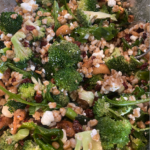
Food As Medicine: Consider the Broccoli Stalk
 When your parents told you to eat your broccoli, they were looking out for your best interests.
When your parents told you to eat your broccoli, they were looking out for your best interests.
We now know that broccoli has several disease-fighting benefits that can optimize many aspects of your health. Some of this pharmaceutical importance includes its antimicrobial, antioxidant, anticancer, immunomodulator, antidiabetic, hepatoprotective, and cardioprotective roles.
We will dive into science a bit, but you will leave this article wanting to crunch on more of this important vegetable.
Broccoli, which originated in Italy, is a cruciferous vegetable or brassica, like cabbage, Brussels sprouts, kale, and cauliflower. Its edible parts include the stem, leaves, and the flowers or head of the stalk.
Nutritional Benefits
Broccoli is an excellent source of vitamins C, K and A, It also provides important minerals like potassium, calcium and iron when consumed. Vitamins like C, E, and A are antioxidants that can protect cells from the damage of harmful free radicals that contribute to oxidative stress and chronic diseases.
Broccoli has more vitamin C than an orange. Vitamin C is important for immune health, collagen production, wound healing, and iron absorption. Broccoli is also a good source of fiber, which aids digestion and a healthy microbiome. It is also an excellent source of calcium, which is important for strong bones and the prevention of osteoporosis.
Broccoli contains many phytonutrients and phytochemicals, which provide many health benefits.
For one, broccoli contains the phytonutrient sulforaphane. This chemical has powerful anti-inflammatory benefits. It has been shown to block the enzymes involved in producing pro-inflammatory cytokines like IL-6 and Tumor Necrosis factor.
Sulforaphane also helps support the body’s detoxification enzymes, which aid in reducing oxidative stress, which is known to contribute to cell and DNA damage. This damage is responsible for the development of abnormal cells, which can lead to cancer. Studies have shown this chemical can slow tumor growth and reduce the risk of developing colonic polyps, which can be precursors to colon cancer. Cruciferous vegetables like broccoli are also biomodulators that support the many detoxification steps in the liver.
Cruciferous vegetables like broccoli also contain isothiocyanates, which are produced by breaking down glucosinolates in the broccoli. These phytochemicals help to reduce oxidative stress directly in the cells. Oxidative stress is caused by free radicals produced during energy production and resulting from chemicals and inflammatory foods in the diet.
Isothiocyanates bind to a protein called Keap-1. Not to get into too much science, but this protein can block the production of protective antioxidants when there is a lot of oxidative stress or free radical damage. This can prevent the cell from activating genes, which produce antioxidants to repair and prevent cellular and DNA damage.
Broccoli and other cruciferous vegetables also contain a phytochemical called Indole-3-carbinol. It has been especially of interest to researchers concerning cancer prevention. Studies show this chemical has anti-cancer properties and is also a well-known chemo drug that has effects including altering estrogen metabolism, inducing cell cycle arrest (cancer cells divide more rapidly, so this is a good thing), and preventing angiogenesis or new blood vessel growth provided to the cancer cells.
Broccoli contains oligosaccharides, a type of food that can act as a decoy to attract infectious and dangerous bacteria in the gut. A mother’s breast milk also contains over 200 oligosaccharides, which contribute to the immune-supporting benefits of breastfeeding. The dangerous bacteria are attracted to these oligosaccharides then ushered out of the gut and hopefully into the diaper.
Broccoli and other cruciferous vegetables, like Brussels sprouts, also contain these oligosaccharides.
These can act as antioxidants in adults, helping to flush out free radicals, which we know contribute to cancer. In fact, a study in the journal Carcinogenesis (2001) concluded that diets high in oligosaccharides prevent tumor formation.
Crunchy plant foods like Broccoli can also directly affect the makeup of our microbiome.
When we consume high-fiber foods in place of processed foods containing sugar, trans fat, and seed oils, we not only miss out on the oligosaccharides, but we also shift your microbiome population to one which is mainly Bacteroidetes (a bacteria responsible for converting plant matter to food) to a population that is mainly Firmicutes, a bacteria strain that loves sugar and flour.
When your gastrointestinal tract is populated by more of this Firmicutes strain, it is easier to gain weight. In fact, this bacterial strain can cause sugar and carbohydrate cravings, leading you to eat the things it loves. This explains why microbiomes higher in the Firmicutes strain are found in individuals with obesity. The good news is you can shift to a microbiome higher in the Bacteroidetes in a short period of time simply by consuming more high-fiber vegetables like broccoli.
We have highlighted some of the important effects of broccoli with respect to its multiple health benefits. Its nutrient and phytochemical makeup support overall health and wellness and may play important roles in cancer prevention and reduction of inflammation. Of course, scientists will say more studies are needed to confirm the extent of these benefits, but instead of waiting on them, there is no harm in adding this and other cruciferous vegetables to your daily diet.



